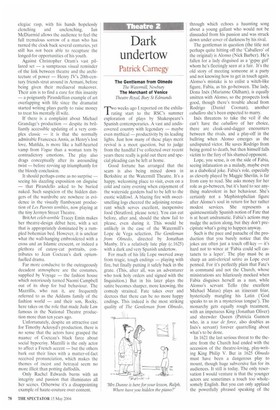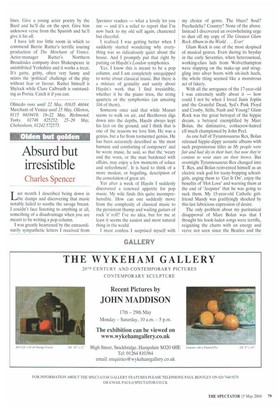Dark undertow
Patrick Cameg
The Gentleman from Olmedo The Watermill; Newbury The Merchant of Venice Theatre Royal, Bury' St Edmunds
ro weeks ago I reported on the exhilaating start to the RSC's summer exploration of plays by Shakespeare's Spanish contemporaries. A vast and undiscovered country with legendary — maybe even mythical — productivity by its leading lights. Just how many of these plays merit revival is a moot question, but to judge from the handful I've collected over recent years there really is gold out there and special pleading can be left at home.
Good fortune has arranged that the seam is also being mined down in Berkshire at the Watermill Theatre. It's a happy, welcoming place to visit, even on a cold and rainy evening when enjoyment of the waterside gardens had to be left to the exotic wildfowl. A blazing fire with sweetsmelling logs cheered the adjoining restaurant which serves excellent, inexpensive food (Stratford, please note). You can eat before, after and, should the show fail to please, even during it. This would be unlikely in the case of the Watermill's Lope de Vega selection, The Gentleman from Olmedo, directed by Jonathan Munhy. It's a relatively late play (c.1625) with a dark and very Spanish undertow.
For much of his life Lope swerved away from tragic, tough endings — playing with fire, but finally putting it safely back in the grate. (This, after all, was an adventurer who took holy orders and signed with the Inquisition.) But in his later plays the satire becomes sharper, more knowing, the comedy strained. Fate takes over and decrees that there can be no more happy endings. This indeed is the most striking quality of The Gentleman from Olmedo, through which echoes a haunting song about a young gallant who would not be dissuaded from his passion and was struck down under cover of darkness by his rival.
The gentleman in question (the title not perhaps quite hitting off the 'Caballero' of the original) is Alonso (Nick Barber). He's fallen for a lady disguised as a 'gypsy girl' whom he's fleetingly seen at a fair. It's the old story of meeting someone at a party and not knowing how to get in touch again. Alonso's mistake is to enlist a witch-like figure, Fabia, as his go-between. The lady, Dona Ines (Marianne Oldham), is equally smitten with Alonso, so the prospects look good, though there's trouble ahead from Rodrigo (Daniel Coonan), another caballero she's been expected to marry.
Ines threatens to take the veil if she can't have the caballero of her choice, there are cloak-and-dagger encounters between the rivals, and a play-off in the bullring when Alonso emerges as the undisputed victor. He saves Rodrigo from being gored to death, but then himself falls victim to the fury of his shamed opponent.
Lope, you sense, is on the side of Fabia, seeing infatuation as a malady, maybe even as a diabolical joke. Fabia's role, especially as cleverly played by Maggie Shevlin, is far from easy to read. She asks money for her role as go-between, but it's hard to see anything malevolent in her behaviour. She's certainly not a Mephistophelian figure after Alonso's soul in return for her rather modest services. She represents a quintessentially Spanish notion of Fate that is at heart undramatic. Fabia's actions may nudge the action along, but they don't precipitate what's going to happen anyway.
Such is the pace and panache of the production that you barely notice that the jokes are often just a touch off-key — it's hard not to wince at `Fabia could sell castanets to a leper'. The play must be as sharp an anti-clerical satire as Lope ever penned. For it's perfectly plain that Fate's in command and not the Church, whose ministrations are hilariously mocked when Fabia disguises herself as a nun, while Alonso's servant Tello (the excellent Michael Matus) plays an itinerant friar, hysterically mangling his Latin (God speaks to us in a mysterious tongue'). The monarchy gets equally rough treatment, with an impetuous King (Jonathan Oliver) and shrewder Queen (Patricia Gannon who, in a tour de force, also doubles as mess servant) forever quarrelling about what's to be done.
In 1621 the last serious threat to the theatre from the Church had ended with the accession of the theatre-loving, play-writing King Philip V. But in 1625 Olmedo must have been a dangerous play to mount, though huge subversive fun for its audiences. It still is today. The only reservation I would venture is that the younger actors are sometimes a touch too wholesomely English. But you can only applaud the powerfully phrased speaking of the lines. Give a young actor poetry by the Bard and he'll die on the spot. Give him unknown verse from the Spanish and he'll give it his all.
I have left too little room in which to commend Barrie Rutter's terrific touring production of The Merchant of Venice.
Actor-manager Rutter's Northern Broadsides company does Shakespeare in uninhibited Yorkshire and it works a treat. It's gutsy, gritty, often very funny and seizes the 'political' challenge of the play without fear or favour. Rutter himself is Shylock while Clare Calbraith is outstanding as Portia. Catch it if you can.
Olmedo runs until 22 May, 01635 46044. Merchant of Venice until 15 May, Merton, 0115 9419419; 18-22 May, Richmond, Yorks, 01748 825252; 25-29 May, Cheltenham, 01242 572573.



































































































 Previous page
Previous page